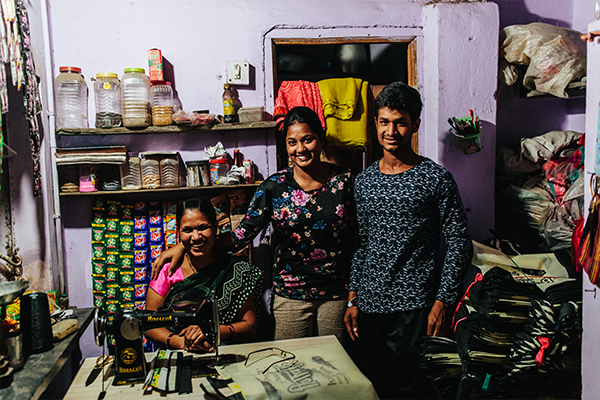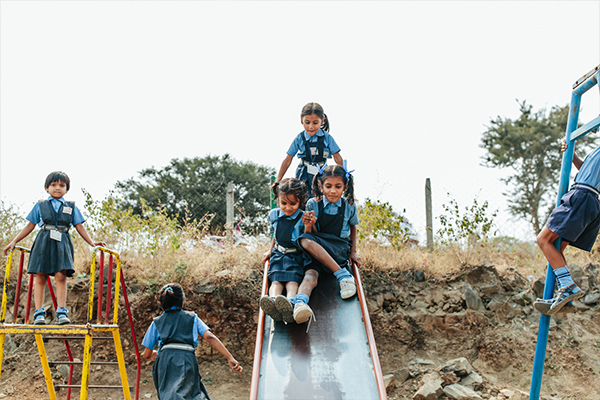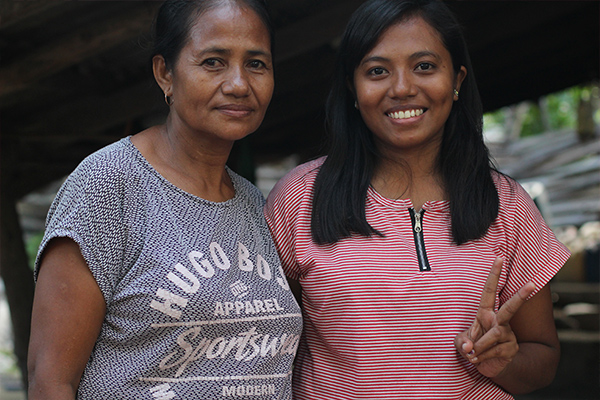The Pink Pandemic: How COVID-19 is doubling down on the gender divide
Women across the globe face many challenges, but particularly in 2020, with disproportionate limitations, and the impact of pandemics and recessions. This International Women's Day provides the opportunity to celebrate the women saying 'I choose to challenge' those inequalities, including the disproportionate affect the COVID-19 has had on women, especially women with children, and young women.
COVID-19 has caused a huge shift in the way we work. Lockdowns led to significant economic slowdowns, along with mass unemployment. The restrictions of the pandemic have forced a rethink of how business works overall and in particular, how women can contribute to our economic recovery and ensure they’re not left behind.

Manda's sewing business has provided her family with a steady income after her husband suddenly died
As the pandemic continues, women, along with micro and small enterprises, are among the hardest hit
According to the latest Inequality Report from Oxfam, the coronavirus pandemic could increase inequality in almost every country at once, the first time this has happened since records began. COVID-19 has not only shone a light on the world’s deepening wealth divide, but it’s also fed off and increased existing inequalities of wealth, race and gender.
The World Bank has forecast a global fall in GDP of 5.2%, despite dramatic government stimulus, while the per capital income in nearly all emerging and developing economies will shrink across the board. This raises the alarm for those in extreme poverty. COVID-19 could push as many as 100 million people into extreme poverty, bringing the global extreme poverty rate to 9.2% (living under US$1.90/day) – which would make it the first increase in extreme global poverty since 1998. Almost half of those projected to be living in extreme poverty are in South Asia.
Women were more likely to lead businesses strongly affected by COVID-19, by ten percentage points, and further to this, around 25% of youth-led businesses said they were likely to shut down permanently – meaning young women are even more at risk. Two thirds of micro and small enterprises are strongly affected and 20% are at risk of permanent closure, according to the International Trade Center (ITC) in its annual SME Competitiveness Outlook.

EduFinance loans are a critical factor in ensuring girls are able to return to school, allowing parents to disperse one off fees through repayments
Girls are dropping out of school at an alarming rate
The World Food Program also estimates that at a minimum, 83 million people, and possibly as many as 130 million will go hungry as a result of the economic recession triggered by COVID-19. UNESCO estimates that 1.6 billion children across the globe were also affected by the closure of educational institutions at the peak of the crisis. In the last few months of 2020, most countries have reopened schools or are making preparations to do so shortly.
Of these students who are dropping out, girls are most at risk of not returning to school, with UNFPA and UNICEF warning that, globally, an additional 6 million child marriages could take place because of the pandemic. The Right to Education’s Indian study, ‘Life in the time of COVID-19’ has estimated 37% of girls from poor Indian households are uncertain to return to school after the pandemic.
A recent EduFinance COVID-19 Impact assessment survey also revealed that 94% parents of boys said they would send their sons back to schools upon reopening, but only 31% of parents said they would re-enrol their daughters.
Girls from developing countries are potentially facing a lifetime of impact due to education poverty. The continued effects of the COVID-19 pandemic, lockdowns and school closures have created a backward step for gender equality and reduced opportunity for Opportunity’s female clients.

Marce's fishing business helps send her daughter (pictured, right) to school.
Women, their businesses, and their future need to be at the forefront of our COVID-19 economic recovery
Progress towards gender equality and global GDP growth are also at risk as women bear the brunt of the pandemic’s economic repercussions. Women’s work is hit harder, for reasons laid out by Harvard Business Review, including:
- The increased burden of unpaid family care has fallen disproportionately on women (women contribute 75% of this labour, globally.) Whilst there were some magnificent examples of fathers stepping up to help supervise children’s online learning experiences, research shows that the majority of household work was picked up by women, with additional stressors only exacerbated by the pandemic
- This increased burden heavily constrains a women’s ability to carry on paid work outside of the home. In India, the female labour force participation rate was a very low 24% even before COVID-19 struck. With an even greater burden of unpaid responsibilities undertaken by women, the current labour force participation rate is likely to be far lower.
- Women are also more likely to work in the service sector and education, and work in the informal sector, which have been hardest hit by health restrictions. This has created reduced viability of and investment in women led businesses.
- The review also documented an implicit bias against women during business layoffs, based on the “assumption” that men’s salaries are more crucial for family income.
- As girls are withdrawn from school their future ability to engage in employment or economic activity outside the home is severely constrained as they are not able to gain literacy and numeracy skills to required levels.
Our support of women, and focus on providing economic opportunity to women, is critical to building a future where all are offered equal access to employment and education. Across the globe, our EduFinance partners are working to re-engage girls in education, to build the leaders of tomorrow.
For now, as economies are rebuilt from the ground up, we know it will be women who will lead the way. By providing them with the tools and capital to get (re)started, we all have a fighting chance of recovering and building a stronger, more resilient, future.
Ensure that a girl returns to school to complete her education. Donate today.